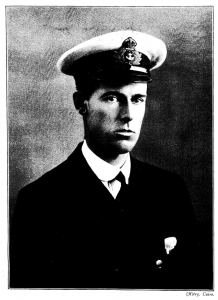Our Portrait Study: Lieutenant Frank Gilliland, RNVR
The Yachting Monthly, March, 1917
During its early years, The Yachting Monthly presented a portrait study of some person best representing those qualities the magazine held in highest regard: a strong, upright character, leadership, seamanship, a love of sport, etc. The first portrait study was of HM King Edward, VII. During the war, when the magazine acted as the official publication for the RNVR, a number of volunteer officers were presented.
The March, 1917 issue included this study:
The Yachting Monthly, March, 1917
During its early years, The Yachting Monthly presented a portrait study of some person best representing those qualities the magazine held in highest regard: a strong, upright character, leadership, seamanship, a love of sport, etc. The first portrait study was of HM King Edward, VII. During the war, when the magazine acted as the official publication for the RNVR, a number of volunteer officers were presented.
The March, 1917 issue included this study:
Lieut. Gilliland requires no introduction in readers of the Yachting Monthly, for he has managed to entertain them on many occasions. Belore all else, a keen sailorman, his writings are always deserving of careful attention, being full of sound commonsense. Outspoken and emphatic as becomes a stauch son of Ulster, he is Frank hy name and frank by nature, and while not exactly spoiling for a fight he is ever ready to cross swords to vindicate his opinions. But of the honesty of these opinions he has first to be fully convinced. In our first November number he described his yacht May, and most of us remember the Ideal Cruiser controversy and the part played by both May and her owner. Those were merry days, and the keenness of the controversy proved the genuine enthusiasm of the participators. May.s owner was in the thick of them in charcteristic vein.
On the outbreak of war Ireland was in a ferment, and perhaps Lieui. Gilliland turned from a prospective civil war, and with many another loyal Ulsterman marched to the real thing. He promptly joined the Ulster Division, for then there was no opening for a man who wished to serve at sea. And so, from September, 1914, he as a "sodger." In July, 1915, however, he was able to obtain a transfer and a sub-lieutenant.s commission in the R.N.V.R., and since February, 1916, he has been on foreign service in the M.L. patrol, like so many of our men.
Educated at Harrow and at Trinity College, Cambridge, Lieut. Gilliland has always been an enthusiastic cruiser. Racing has no charms for him, and he much prefers to navigate his little ship round the difficult coasts of North Ireland and the Western Islands of Scotland. Of these cruises he has told us on many occasions. He is a member of the Royal Thame Yacht Club and of the Royal Cruising Club, which latter awarded him the De Horsey Cup in 1911 for an essay on "The North Coast of Ireland as a cruising ground."
On the outbreak of war Ireland was in a ferment, and perhaps Lieui. Gilliland turned from a prospective civil war, and with many another loyal Ulsterman marched to the real thing. He promptly joined the Ulster Division, for then there was no opening for a man who wished to serve at sea. And so, from September, 1914, he as a "sodger." In July, 1915, however, he was able to obtain a transfer and a sub-lieutenant.s commission in the R.N.V.R., and since February, 1916, he has been on foreign service in the M.L. patrol, like so many of our men.
Educated at Harrow and at Trinity College, Cambridge, Lieut. Gilliland has always been an enthusiastic cruiser. Racing has no charms for him, and he much prefers to navigate his little ship round the difficult coasts of North Ireland and the Western Islands of Scotland. Of these cruises he has told us on many occasions. He is a member of the Royal Thame Yacht Club and of the Royal Cruising Club, which latter awarded him the De Horsey Cup in 1911 for an essay on "The North Coast of Ireland as a cruising ground."
